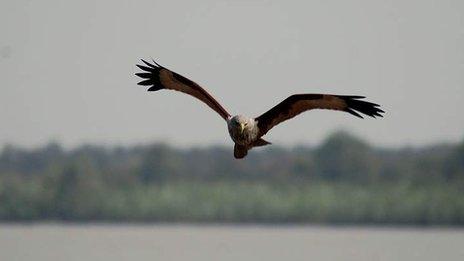Kidnapped Qatari hunting party of 26 freed in Iraq after 16 months
- Published
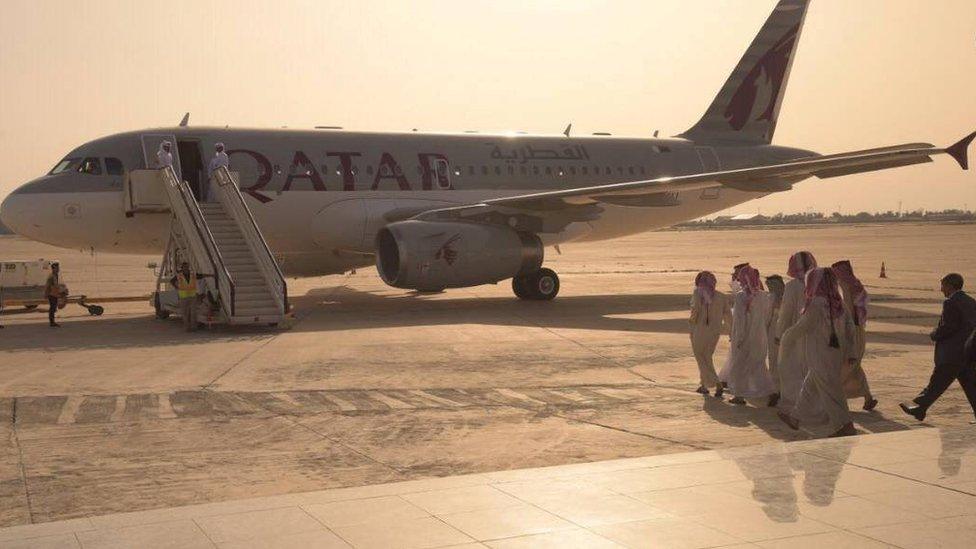
The Qatari nationals boarded a flight for Doha in Baghdad, Iraq, on Friday
A group of Qatari hunters - including members of the ruling family - have been freed 16 months after being kidnapped in Iraq, officials say.
The Iraqi interior ministry said "all 26" were in Baghdad and would be handed over to a Qatari envoy.
The hunters were abducted by gunmen in a desert area of Iraq near the Saudi border in December 2015.
A large-scale search was launched but very little information was known about the group's whereabouts or condition.
On Friday, the group was flown back to Qatar's capital, Doha, Iraqi officials said.
Their release was part of a far-reaching regional deal involving the evacuation of civilians in neighbouring Syria, AFP news agency reports, citing sources close to the negotiations.
"The interior ministry has received the Qatari hunters, all 26 of them," an Iraqi interior ministry official told AFP, adding: "They will be handed over to the Qatari envoy."
Footage later released by the ministry showed some of the former hostages dressed in white gowns and red headscarves as they were greeted by officials in the high security Green Zone in Iraq's capital, Baghdad.
They were then seen in the video boarding a Qatar Airways plane at Baghdad airport. State media later confirmed that they had landed in Doha.
What's known about the kidnapping?
The group was seized in December 2015 while on a licensed hunting trip near the border with Saudi Arabia.
The hostages were abducted when gunmen swept into their camp at dawn in four-by-four vehicles.
The hunting party is widely believed to include one or several more prominent members of the Qatari royal family, although they have not been identified.
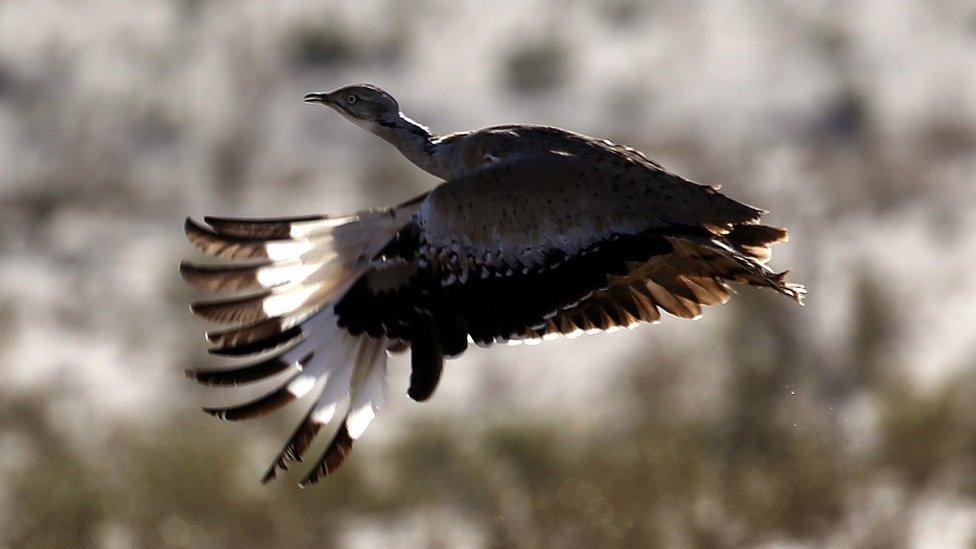
The Asian houbara bustard, found in Iraq, is highly prized in the Arab Gulf states
They were hunting the Asian houbara bustard, akin to a small turkey, using falcons trained to home in on their quarry.
Why are they being released?
Their release is said to be connected to a complex deal in Syria involving the evacuation of four besieged towns, which was announced earlier this week.
However, the interior ministry has not provided details confirming this.
The Guardian newspaper has reported , externalthat an Iraqi militia with strong ties to Iran, a key backer of the Syrian government and its ally Hezbollah, was holding the Qatari hunters.
It says the deal involves the Syrian Islamist group Ahrar al-Sham, Iran, the Lebanese militant group Hezbollah and Qatar.
A Qatari royal and a Pakistani man were freed earlier this month.
Also on Friday, a spokesman for Ahrar al-Sham told Reuters that the Syrian government was going to release 500 prisoners into rebel-held territory, as part of a swap deal.
What is the 'four towns' deal?
It is an agreement to end the sieges of four towns - two surrounded by pro-government forces, two by rebel and Islamist fighters - in eastern Syria.
Foah and Kefraya are mainly Shia Muslim, government-held towns, close to the border with Lebanon, which have been besieged since March 2015.
Madaya and Zabadani are rebel-held towns in the north-east, which have been besieged since June 2015 by the Syrian army and fighters from Lebanon's Shia Muslim Hezbollah movement.
Conditions have been desperate, especially in Madaya and Zabadani, with severe shortages of food, medicine and fuel. International aid deliveries have been infrequent and required careful negotiation. Government air drops have eased the situation in Foah and Kefraya somewhat.
Under the exchange deal, residents of Foah and Kefraya are being bussed to government-held Aleppo, while people in Madaya and Zabadani are being taken to rebel-held areas.
The evacuations began last week, but were held up after a bomb attack hit the convoy of buses from the two government-held towns, killing at least 126 people including 68 children.
Thousands of evacuees from Foah and Kefraya have also been held up at a staging point for 48 hours, but a rebel involved in the operation told AFP that the buses had left after the news of the release of government-held prisoners.
According to AFP, the current phase of evacuations involves 8,000 people from Foah and Kafraya, and 2,500 civilians and rebels from Madaya and Zabadani.
A second phase is to begin in June.
- Published17 April 2017
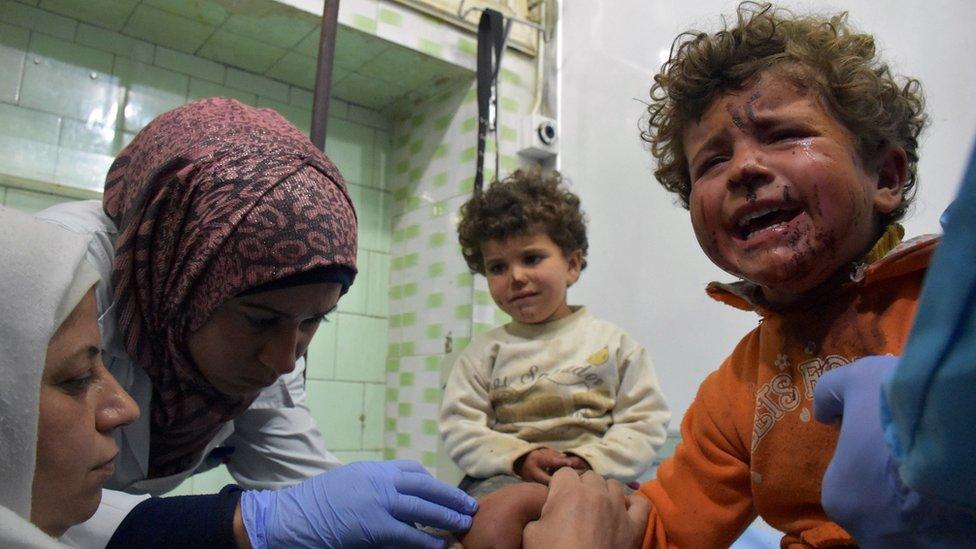
- Published16 December 2015
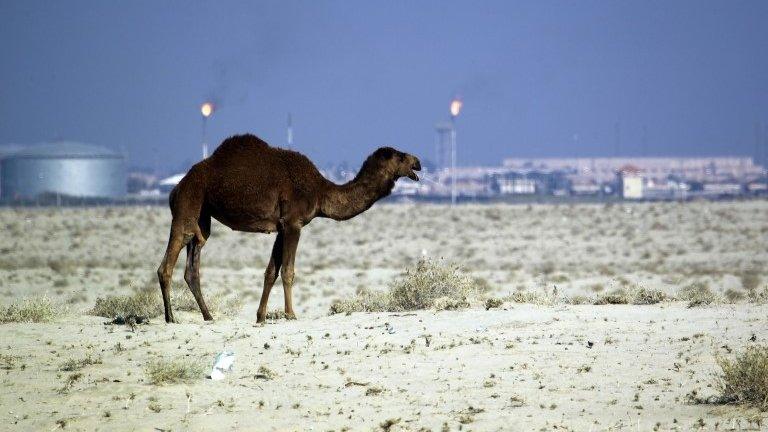
- Published31 January 2017
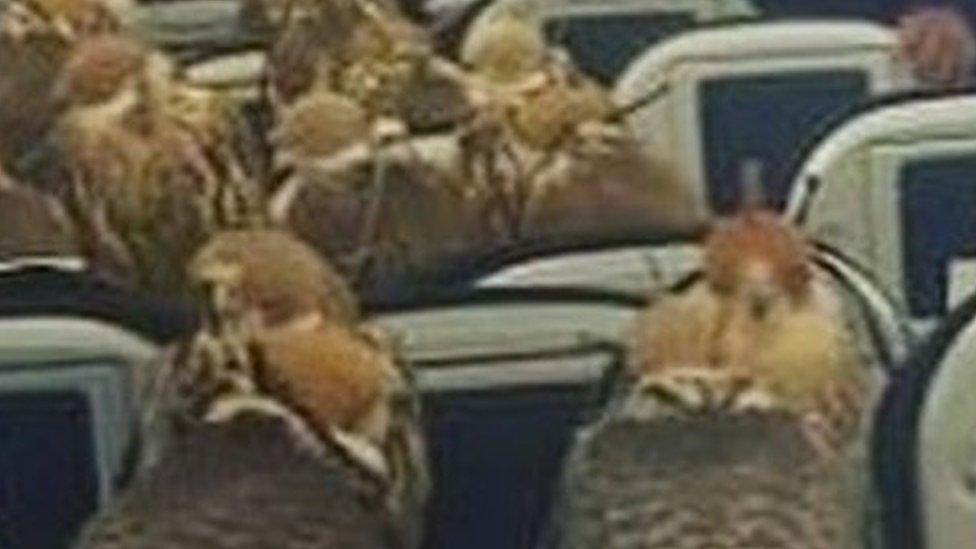
- Published16 November 2011
